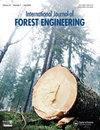Manipulating grading strategy for the efficient harvesting of industrial poplar plantations
IF 2.1
3区 农林科学
Q2 FORESTRY
引用次数: 5
Abstract
ABSTRACT New short rotation poplar plantations yield a mix of biomass and logs, whereby the latter are used for board production and represent the most valuable component. Therefore, there is an interest in maximizing log yield, which must be balanced against the incremental time consumption incurred for manufacturing any additional logs. This study explored the optimization potential of manipulating log specifications and grading instructions in order to decrease time consumption or increase log yield. A controlled experiment was set up to determine the merits of 1) renouncing the manufacturing of a second small log to expedite processing or 2) decreasing small end diameter to increase the proportion of viable logs in any given stem. The experiment indicated that strategy one did not pay, since the productivity increase was minimal and non-significant, while the log yield losses were meaningful and significant. In contrast, strategy two was efficient in increasing log yield, without any negative effects on harvesting productivity.操纵分级策略以实现工业杨树人工林的高效采收
摘要:新的短周期杨树人工林生产生物质和原木的混合物,后者用于板材生产,是最有价值的成分。因此,人们对最大化原木产量感兴趣,这必须与制造任何额外原木所产生的增量时间消耗相平衡。本研究探索了操纵原木规格和分级指令以减少时间消耗或提高原木产量的优化潜力。建立了一个对照实验,以确定1)放弃生产第二个小原木以加快加工的优点,或2)减小小端直径以增加任何给定树干中活原木的比例。实验表明,策略一没有付出代价,因为生产力的提高是最小的,也不显著,而原木产量的损失是有意义的,也很显著。相比之下,策略二在提高原木产量方面是有效的,对收割生产力没有任何负面影响。
本文章由计算机程序翻译,如有差异,请以英文原文为准。
求助全文
约1分钟内获得全文
求助全文

 求助内容:
求助内容: 应助结果提醒方式:
应助结果提醒方式:


